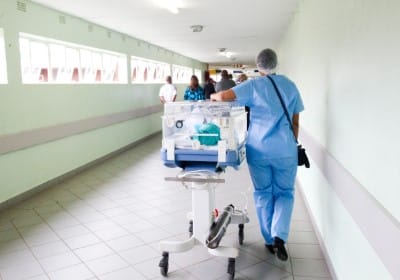
This article will cover:
- How the Italian healthcare system works
- The costs of health care services in Italy
- The eligibility criteria to apply for health services in Italy
- An overview of the Italian healthcare system’s quality and best providers.
How does the Italian health system work?
The Italian healthcare system is publicly funded and comprises public and private services.
It’s organized and managed at national and regional levels according to the principles and standards established by the Ministry of Health. Local health units determine how these services will be delivered.
Each region is responsible for regional health planning, including local health units (Aziende Sanitarie Locali, ASL), public hospitals, health services, health care planning, and specialized medical centers.
Italy’s healthcare system is primarily funded by taxes, but other contributions come from regional and local government agencies that support the national system.
National health service
Public health services in Italy are provided by the National Health Service (Servizio Sanitario Nazionale, SSN), which was established in 1978 to provide all Italian citizens and residents with access to public health insurance.
The system of national health service operates under the principle of universal coverage, which is meant to provide free or almost free care to all those in need. There might be additional co-payments, but these are typically minimal.
Private health insurance
While Italy’s National Health Service (SSN) offers universal healthcare coverage for residents, some people opt for private health insurance to access additional services and shorter waiting times.
Private health insurance also grants access to private hospital care and clinics, which aren’t available to those using the national health service.
Other benefits of having Italian private health insurance include the freedom to choose the doctors, specialists, and medical facilities that best suit one’s needs.
You can opt for complementary private health insurance or full private medical insurance. Complementary health insurance is an additional insurance you can get on top of the National Health Service. includes extra services like specialist visits, elective surgeries, dental care, and preventive medicine.
The full private healthcare option offers complete coverage and typically includes private consultations with healthcare professionals, private hospital admissions, and access to private healthcare facilities. However, this option is more expensive.
The Structure of The Italy Healthcare System

- Primary care and family doctor: In Italy, it’s important to have a family doctor. A family doctor is the first main contact patients have within public health services. You can visit your family doctor for routine health issues, general check-ups, non-emergency medical conditions, and other issues that fall into the category of primary care.
- Hospital care: Hospital admission in Italy is usually tied to more severe medical issues, and it allows Italian citizens and residents to receive more in-depth care. Patients use it for emergency care, surgeries, and rehabilitation services.
- Preventive services: Italy emphasizes the prevention of chronic diseases. So, if you have public health insurance, you can access vaccinations, screenings, and public health programs.
The Cost of Healthcare in Italy
On a national level, the Italian healthcare system is significantly affordable. The primary goal of the country’s National Health Service is to allow all residents access to public health services for free or with minimal cost-sharing.
Italy also has a range of private medical insurance providers, but they are more costly.
The cost of public healthcare in Italy
Even though most Italian public health services are free under the national health system, you may have to pay a modest fee for certain specialist visits, diagnostic tests, and elective procedures. This is known as a “co-payment”.
Here’s the list of services which are typically free in Italy:
- Visits to family doctors
- Emergency care
- Hospitalization
- Preventive care
- Maternity care
- Specialist care
- Medications
Here’s the list of services for which you have to pay a small fee in public host:
- Specialists visits
- Diagnostic tests
- Non-urgent emergency room visits
- Medications
It’s important to note that some patients are exempt from co-payments. This depends on your age, income, and medical conditions.
Here’s the list of patients who are commonly exempted from co-payments:
- Low-income patients
- Children under the age of six and adults over the age of 65
- Patients with certain chronic diseases or disabilities
- Pregnant women for maternity care services
The cost of private healthcare in Italy
The main advantage of private health care insurance in Italy is quick and easy access to private hospitals and personalized treatments.
The cost of private health care insurance in Italy mainly depends on your health care provider and the type of plan you have.
Here’s the breakdown of the cost of private healthcare plans in Italy:
- Basic plans: These typically cost from €500 to €1,200 a year and include outpatient care, specialist consultations, and some diagnostic tests.
- Comprehensive plans: These include hospital stays, surgeries, and emergency care in private hospitals, and they can cost from €1,500 to €3,500.
- Family plans: Family plans typically cover multiple members of your family, and the costs can range between €1,200 and €5,000 a year, depending on the coverage.
Here’s the breakdown of costs associated with private health insurance services in Italy. Please note that these are estimations:
Type of service | Cost of service |
Consultation fees | From €80 to €250 |
X-rays | Between €50 and €100 |
MRIs | From €200 to €500 |
Blood tests | From €30 to €100 or more |
Hospital stays | From €500 to over €1,000 (overnight) |
Simple procedure | Between €3,000 and €6,000 |
Complex procedure | Between €10,000 to €20,000 |
Urgent care | From €200 to €600 |
Maternity and childbirth | From €3,000 to €10,000 |
4 Best Private Insurance Providers in Italy
The top five best private medical insurance companies in Italy are:
- Allianz Care: Allianz is one of the largest insurance companies in the world it offers a wide range of plans in Italy as well.
- Generali Italia: This is one of the most prominent Italian insurance companies. It offers customizable plans for outpatient services, specialist visits, diagnostic tests, dental care, and more.
- UnipolSai: UnipolSai is a reputable Italian insurance provider that has wide coverage options, competitive pricing, and advanced coverage plans.
- Cigna Global: This is yet another international provider with a strong presence in Italy. Their most important feature is flexible and customizable plans.
Who is eligible for Italian healthcare?
Here’s the list of all people who are eligible for Italian healthcare.
1. Italian citizens and legal residents
The national health care system automatically covers all Italian citizens and legal foreign residents living in Italy.
Foreign residents must register with their local ASL to obtain an Italian health insurance card, which allows them to access public healthcare services.
2. European Union citizens
Citizens of other European countries can access Italian healthcare services using their European Health Insurance Card (EHIC). During short stays or emergencies, they will receive the same medical care as Italian residents.
3. Non-EU nationals
Non-EU nationals who reside in Italy for extended periods can get public health insurance as long as they register with the local health authority. Tourists, on the other hand, should get private medical insurance in case of emergencies in Italy.
Other great ways to get healthcare in Italy as a non-EU national are to get an Italy Digital Nomad Visa or an Italy Golden Visa, which gives you access to the Italian healthcare system.
4. Refugees
Refugees and asylum seekers can apply for public health insurance under the national health system, just like Italian citizens. It’s important to register with local authorities before your application.
How to Get an Italian Health Insurance Card
An Italian health insurance card (known as Tessera Sanitaria) is a document needed to access the country’s public healthcare services. It’s acknowledged on both national level and regional level, and you can use it anywhere in Italy.
Here’s a step-by-step guide on how to get an Italian health insurance card:
- Obtain residency in Italy: To qualify for the SSN and the Tessera Sanitaria, you need to be an Italian citizen or resident. If you’re not an Italian citizen, you’ll have to obtain a residency permit through a special visa, such as the Italy Golden Visa or the Italy Digital Nomad Visa.
- Register with the Local Health Authority (ASL): Once you become an Italian resident, you can register with your local health authority (Azienda Sanitaria Locale—ASL).
- Choose a General Practitioner: After the registration, you have to choose your general practitioner or family doctor. The ASL office will provide you with a list of available doctors in your area.
- Get your Italian health insurance card: You will receive your Italian health insurance card either in person or by mail. Then, you can use it in Italy and in the EU to access a variety of medical services.
Healthcare Facilities in Italy
Italian healthcare system consists of different facilities, specialized in different fields:
- Public hospitals (Ospedali Pubblici): Public hospitals in Italy are funded by Italian government and they provide emergency services, surgeries, and specialized care. These are covered by the national health system.
- General practitioner (GP) offices: These are family doctors and they are also covered by the national health system.
- Multispecialty clinics: These facilities are designed to treat more chronic illnesses. In multispecialty clinics, you’ll find various medical specialists who offer outpatient care.
- Private hospitals and clinics: Private hospitals and clinics are typically faster, but more expensive than public hospitals. They offer similar services as public hospitals.
- Pharmacies (Farmacie): These are used to pick up your prescriptions.
- Emergency care centers (Pronto Soccorso): Emergency care centers are meant for urgent medical needs.
Specialized Healthcare Services in Italy
In Italy, you’ll find a variety of specialized healthcare services that go beyond regular medical care. The most prominent specialized healthcare services include:
- Dental care: Similar to the regular healthcare system, dental care is divided into two main sectors—public and private dental clinics. Public dental clinics are covered by the national health service while private ones have a wider selection of services, such as cosmetic dentistry.
- Mental healthcare: Mental healthcare in Italy is a part of the national health system. You may find counseling, therapy, and psychiatric care in Italy. Besides that, there are private mental healthcare options that offer a wider range of therapies.
- Alternative medicine: Alternative medicine, such as acupuncture, homeopathy, and herbal medicine is another way of treating illnesses in Italy. Typically, these aren’t covered by public health insurance.
Health Emergencies in Italy
If you’re facing a medical emergency in Italy, call the universal emergency number—118. This number is meant for immediate medical ambulance services.
You can also dial a local hospital emergency department, but you have to check the number online or write it down.
Here’s the list of all emergency numbers in Italy:
Entity | Telephone Number | Details |
Medical emergency | 112 | Available 24 hours a day, every day. |
Police, fire, and medical emergencies | 118 | Available 24 hours a day, every day. |
Local hospital emergency departments | Check online | Check online |
SoS drug line | 800 186 070 | Available 24 hours a day, every day. |
Quality of Healthcare in Italy

Italian citizens and residents have access to primary care through Italian health insurance cards, and there is no cost of primary care insurance or patients have to pay minimal co-payments for additional treatments and medicine.
Italy has highly trained health professionals, several of which are recognized internationally, as well as cutting-edge technology and devices.
Italy’s total health spending has recently been between eight to nine percent of GDP, which is moderate when compared to other European countries like Germany and France. Usually, other countries use more funding for total health spending.
Italy Healthcare System Pros and Cons
The Italian healthcare system is one of the best in the world. It offers universal coverage and high-quality care, as well as a comprehensive network of public and private healthcare services accessible to everyone.
Italy’s healthcare system consists of national and regional health services and it offers affordable healthcare for Italian citizens, legal residents, and tourists.
Unfortunately, there are disparities between regions, and waiting times with family doctors and in public hospitals can be extremely long.
Pros of the Italian health system
- Universal public healthcare system: One of the biggest advantages is that healthcare in Italy is accessible to everyone, no matter what their socio-economic status might be.
- Affordability: Public health care in Italy is free or comes with minimal co-payments. Some citizens may even be exempted from these additional costs.
- High quality of care: Italy’s healthcare system has a very high standard of care and advanced medical devices, especially if you go to private facilities.
Cons of the Italian health system
- Regional differences: Regional health systems differ from region to region. While northern regions have better equipment and resources, those facilities in the south don’t have the same quality of healthcare system. Local health authorities are trying their best to reduce the discrepancy.
- Waiting times: Since a lot of Italian citizens attend public hospitals and this typically means longer wait times.
- English-speaking doctors: In public hospitals, it might be challenging to find English-speaking doctors.
Frequently Asked Questions About Healthcare in Italy
Is healthcare free in Italy for foreigners or expats?
Healthcare in Italy is free as long as you have Italian citizenship or residency. In case you’re a non-EU national, you have to choose one of the private providers of health insurance.
How does healthcare in Italy work for foreigners?
Healthcare in Italy for foreigners operates through the national health service. While EU citizens can use the European Health Insurance Card and don’t have to register with the national health service, non-EU residents must register with the SSN or get private medical insurance.
What are the main benefits of Italy’s public healthcare for foreigners?
The main benefits of Italy’s public healthcare for foreigners are universal access, low-cost services, and wide coverage for doctor visits, hospital care, and emergencies.
Can foreigners access Italy’s national healthcare system?
Yes, foreigners can access Italy’s national healthcare system.
EU citizens who own a European Health Insurance Card get free or reduced-cost care. Non-EU citizens, on the other hand, may need private insurance. You can still apply for the SSN for coverage, if you have a residency card for Italy.
It’s important to note that emergency services are available to everyone, no matter their nationality.
What is the ranking of the Italian healthcare system globally?
Italian healthcare is consistently ranked among the best in the world. In 2024, Italy ranked 22nd globally, according to the CEOWORLD magazine’s Health Care Index.
Do foreigners need private health insurance in Italy?
Foreigners might need private health insurance in Italy, especially if they aren’t EU citizens. Non-EU residents can apply for Italy’s national healthcare system when they get residency status.
How do expats get a family doctor in Italy?
Expats in Italy typically get a doctor by registering with the local health authority (ASL), after applying to the national healthcare system. After the registration process, expats in Italy can choose a practitioner.
Are there any language barriers when accessing healthcare in Italy for foreigners?
Yes, there are language barriers when accessing healthcare in Italy as a foreigner. Most of the staff speaks Italian, especially in more rural areas. Luckily for you, there are English-speaking doctors and nurses in major cities like Rome and Milano.


